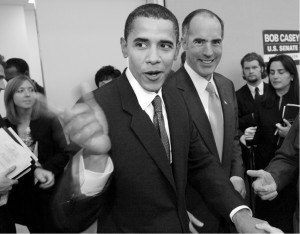Is This Any Way to Run a City’s Schools?
Leaked CTU Proposals Won’t Do Anything to Improve Schools’ Poor Performance
(Source: September 2010 NRTWC Newsletter)
Since forced-unionism cheerleader Barack Obama became President in January 2009, Big Labor bosses and their yes-men in the U.S. Congress have helped him inflict a lot of damage on employees, businesses, and taxpayers across America.
 To take just the latest example, last month union puppet politicians in the Senate and House rubber-stamped a special-interest measure (H.R.1586) that will ultimately extract an additional $10 billion from beleaguered private-sector employees and businesses to maintain and expand wasteful unionized government payrolls.
To take just the latest example, last month union puppet politicians in the Senate and House rubber-stamped a special-interest measure (H.R.1586) that will ultimately extract an additional $10 billion from beleaguered private-sector employees and businesses to maintain and expand wasteful unionized government payrolls.
From 1998 to 2007, the number of instructional employees at K-12 public schools nationwide soared by 15.9% — an increase 3.5 times greater than the 4.5% growth in school enrollment over the same period.
The rapid-fire expansion of school payrolls, roughly 70% of which are unionized, produced no measurable improvement in educational outcomes, but cost taxpayers tens of billions of dollars.
And the terms on which H.R.1586 piles on another $10 billion are expressly designed to ensure that currently strapped states do not pare back the past decade of teacher union boss-driven growth in K-12 payrolls in order to avoid increasing the burden on taxpaying individuals and businesses.
On August 11, just one day after the House had okayed H.R.1586, President Obama signed it into law.
Big Labor Bosses Still Far From Satisfied
But despite having received a host of handouts like H.R.1586 during the past two years, top union bosses remain far from satisfied. They are making no secret about the fact that they think they are still owed at least a few more juicy legislative plums before the end of this Congress.
After all, as union dons never hesitate to remind the Democratic President and congressional leaders, they, more than any other special-interest group, are responsible for giving one political party control of the White House and lopsided Senate and House majorities at the same time.
It’s estimated that, in 2007 and 2008, the union political machine pumped well over a billion dollars, mostly siphoned off from workers’ forced union dues and fees, into efforts to put Big Labor Democrats in firm control of the executive and legislative branches of the federal government.
Consequently, union barons expected to see enacted in the current Congress legislation that would help them sharply increase the share of all private-sector workers who are under union monopoly-bargaining control.
Their original vehicle for achieving this objective was S.560/H.R.1409, the so-called “Employee Free Choice Act.”
Sponsored by Big Labor Sen. Tom Harkin (D-Iowa) and Congressman George Miller (D-Calif.), S.560/H.R.1409 would grease the skids for union-boss workplace takeovers in several ways. Most famously, it would effectively end secret-ballot elections in union organizing drives, replacing them with so-called “card checks.”
That means, if S.560/H.R.1409 became law, union organizers would have far more opportunities than they currently do to intimidate individual workers into signing not just themselves, but all of their nonunion fellow employees, over to Big Labor control.
Right to Work Resistance Has Stalled Power Grab
Unfortunately for union bigwigs, since early 2009 the National Right to Work Committee and its allies have mobilized massive public opposition to S.560/H.R.1409, greatly lowering its prospects for passage in its current form.
In response, for many months now Big Labor lobbyists and politicians have huddled together with the intent of concocting new, passable legislation that would accomplish the same objective through somewhat different means.
Now it seems that their “Plan B” might well emerge in the 2009-2010 Congress — but not until after Election Day!
On August 12, union-label Senate Majority Leader Harry Reid (D-Nev.) publicly confirmed what freedom-loving Americans have suspected for some time: that he will reconvene the Senate soon after Election Day on November 2. Under his plan, the “lame duck” chamber could remain in session until well into December, with only a brief Thanksgiving recess.
Reid lieutenant Jeff Bingaman (D-N.M.) has confirmed that the Senate will be considering major policy initiatives, and not just “must-pass” budget bills, after Election Day.
“It may well be we have to wait until a lame-duck session to pass whatever we’re able to pass,” Mr. Bingaman admitted to the Capitol Hill newspaper Politico in mid-August.
House Speaker Nancy Pelosi (D-Calif.) has also made it clear she intends to hold a “lame duck” session in her chamber, though she has yet to publicly announce a schedule
“Union bosses from AFL-CIO czar Richard Trumka on down are now reiterating their demand that Harry Reid and Nancy Pelosi bring up the ‘card check’ bill, or its near equivalent, before the 2009-2010 Congress is over,” noted Right to Work President Mark Mix.
“Mr. Reid and Ms. Pelosi are desperate to satisfy their Big Labor patrons. But at the same time they want to minimize the electoral damage that voting for this power grab would do to vulnerable union-label politicians in their caucuses. That’s why the Big Labor Democrat leaders lean to the ‘lame duck’ strategy.”
Public-Safety Union-Monopoly Bill Could Also Be on ‘Lame Duck’ Agenda
“And ‘card-check’ forced unionism isn’t the only major rewrite of federal labor policy that may come up in the Big Labor Congress after November 2,” Mr. Mix continued.
“Another strong possibility is H.R.413/S.3194, legislation cynically mislabeled as the ‘Public Safety Employer-Employee Cooperation Act.’
“This measure would, at a time when government budget deficits are already sky high, hobble the ability of states and localities to keep their expenditures of taxpayer dollars under control.
“H.R.413/S.3194 would empower Federal Labor Relations Authority bureaucrats to survey all 50 states and identify which have failed to meet ‘core standards.’ And the key ‘core standard’ is mandatory union monopoly bargaining.
“Localities in all 50 states would be denied the option to refuse to grant a single public-safety union the power to speak for all front-line employees, including those who don’t want to join.
“Monopoly bargaining, euphemistically labeled as ‘exclusive representation,’ would be foisted on police, firefighters, and other public-safety employees nationwide. And in most states that already authorize public-safety union monopoly bargaining, H.R.413/S.3194 would widen its scope.”
Right to Work Supporters Must Not Let Their Guard Down — Even After Election Day
Mr. Mix pointed out that, up to now, the Right to Work Committee and its members have led a successful campaign to block the union brass from ramming police/fire monopoly-bargaining legislation through Congress.
However, he added, large majorities of both chambers of Congress, including a number of Republicans as well as practically every Democrat, are on the record in favor of H.R.413/S.3194. Now is certainly not the time to declare victory.
“Right to Work members and supporters nationwide must be prepared to keep turning up the heat on their senators and congressmen, even after Election Day, to ensure that neither a gussied-up version of ‘card check’ nor police/fire monopoly bargaining is enacted late this year,” said Mr. Mix.
“It might be hard for some people to believe that even Harry Reid, Nancy Pelosi, and President Obama would be audacious enough to try to grant enormously consequential new special privileges to Big Labor during a ‘lame duck’ congressional session.
“But the grim determination of these politicians to help union bosses corral workers into unions, by hook or crook, cannot be overestimated.
“Forced-unionism opponents can’t afford to let their guard down for one moment. Not now, with crucial elections just a few weeks away. But not after Election Day, either.”
If freedom-loving citizens don’t keep turning up the heat on their senators and congressmen late this fall, a looming “lame duck” session of Congress could end up doing severe damage to the Right to Work.

Leaked CTU Proposals Won’t Do Anything to Improve Schools’ Poor Performance

Wherever Big Labor wields the power to collect forced union dues, union bosses funnel a large share of the confiscated money into efforts to elect and reelect business-bashing politicians. Employment growth tends to lag as a consequence.

Members Insist They Keep Pro-Right to Work Campaign Promises